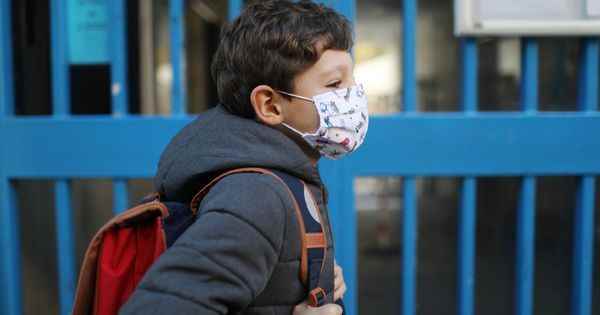Posted , update
3 min read
Isolation, teleworking, compulsory mask from 6 years old… At the start of the year, the government revised certain rules in order to fight against the fifth wave of the Covid-19 epidemic carried by the Omicron variant.
While the incidence rate of Covid-19 has exploded since the arrival of the Omicron variant on French territory, the government has decided to put in place new measures to counter this new wave from January 3, 2022.
New isolation rules
For people vaccinated:
In case of infection, “solitary confinement is now for 7 days (full) after the date of onset of signs or the date the positive test was taken. Nevertheless, after 5 days, the positive person can be released from isolation under two conditions:
- it performs an antigen test or RT-PCR and it is negative,
- she has had no clinical signs of infection for 48 hours.
If the test carried out is positive or if the person does not perform a test, their isolation is maintained for 7 days. She does not perform a second test on D7.”
If you are in contact, there is no longer a quarantine. The government nevertheless recommends carrying out an antigen test or PCR immediately, then self-tests on D2 and D4 after the last contact with the positive person.
For people who have not been vaccinated or have an incomplete vaccination schedule:
“Isolation is 10 days (full) after the date of onset of signs or the date the positive test was taken, explains the government. Nevertheless, after 7 days, the positive person can be released from isolation under two conditions:
- she performs an antigen test or RTPCR and it is negative,
- she has had no clinical signs of infection for 48 hours.”
If you are in contact, you have to “respect a 7-day isolation (full) from the date of the last contact”. To get out of quarantine, you must perform an antigen test or PCR and have a negative result.
For children under 12:
For those who are vaccinated and positive, the rules are the same as for vaccinated adults.
“For children under 12 years of age, in the school environment, the national education protocol applies, explains the government. This results in the carrying out a TAG or RT-PCR test for all the students in the class as soon as a case appears in the class, and return to class upon presentation of the negative result.”The pupils should also carry out self-tests on D2 and D4 (covered by Health Insurance and delivered free of charge in pharmacies after the test has been carried out on D0). “Parents must present a sworn statement carrying out these tests to allow the student to stay in class.”
Mandatory teleworking at least 3 days a week
“As of January 3, 2022, employers set for a period of three weeks a minimum number of 3 days of teleworking per week, for positions which allow it”, Announced the government, specifying that“when the organization of work and the situation of the employees allow it, this number can be increased to 4 days per week”.
Wearing a mask compulsory from 6 years old
A decree published on December 31, 2021 in the Official Journal now makes it compulsory to wear a mask from 6 years old in certain public places, compared to 11 years previously. Among the places concerned: public transport, boats, planes, and vehicles (including taxis and VTC), airports, stations, markets, cinemas, schools, sports arenas and places of worship.
Return of gauges to public places
With regard to gatherings and leisure, from January 3, 2022 and for a period of three weeks:
- The gauges will be restored for major events: 2,000 people indoors, 5,000 people outdoors. This rule does not apply to political meetings, places of worship, fairs and exhibitions, amusement parks and zoos.
- Standing concerts will be prohibited.
- In cafes and bars, standing consumption will be prohibited.
“Until January 24 inclusive, discotheques are prohibited from welcoming the public, adds the government. This ban applies until the same date to dance activities in establishments open to the public, such as restaurants or bars.”
Consult a general practitioner online
Ban on eating or drinking in transport
On December 27, 2021, Jean Castex announced the ban on eating or drinking in public transport, even main lines. The sale of food or drink on board has been banned until at least January 23. Jean-Baptiste Djebbari, Minister of Transport added: “If you have an imperative need to eat or drink on the train because you are weak or simply because you have this physiological need, you can remove your mask and drink or eat quickly and put it back on immediately afterwards.”
.
dts1
